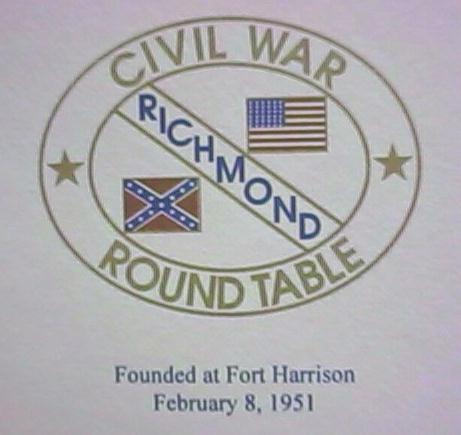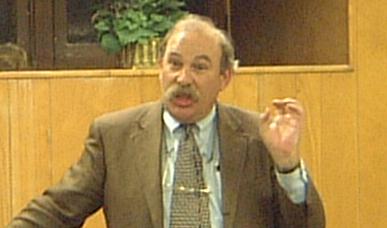


March 2002
Clark H. Lewis, President Art & Carol Bergeron, Editors P. O. Box 1122 3901 Paces Ferry Road Richmond, VA 23218 Chester, VA 23831-1239 March 2002 PROGRAM
William J. Cooper, Jr. "Jefferson Davis and His Generals" 8:00 p.m., Tuesday, March 12, 2002, at the Boulevard United Methodist Church, 321 N. Boulevard, Richmond, VA (corner of Boulevard and Stuart Ave.) Dr. William J. Cooper, Jr., is Boyd Professor of History at Louisiana State University. A native of Kingstree, South Carolina, he received his A. B. degree in history from Princeton University and his Ph.D. in American history from Johns Hopkins University. From 1966-1968, he was in the United States army. Cooper began teaching at L. S. U. in 1968. He served as Dean of the Graduate School there from 1982 to 1989. In the Spring of 2000, Cooper was the Douglas Southall Freeman Professor of History at the University of Richmond. He is the author of The Conservative Regime: South Carolina, 1877-1890 (1968); The South and the Politics of Slavery, 1828-1856 (1978); and Liberty and Slavery: Southern Politics to 1860 (1983). He is the co-author of The American South: A History (1990). His latest book is Jefferson Davis, American (2000). This biography of the President of the Confederacy won the Jefferson Davis Award from the Museum of the Confederacy in 2001 and the Los Angeles Times Prize for Biography in 2001. Cooper has published articles and essays in numerous journals and books, including Journal of Southern History, Encyclopedia of Southern History, and The Dictionary of American Biography. From 1979 to 1993, he was Editor of the Southern Biography Series at Louisiana State University Press, overseeing the publication of 26 books. Cooper has been on the Board of Advisory Editors of The Papers of Jefferson Davis since 1991. Jefferson Davis frequently had difficulties with his generals during the Civil War. As a hero of the Mexican War and former Secretary of the Army, Davis considered himself a military expert and probably would have preferred to have commanded a Confederate army instead of being president. Cooper will examine Davis' relations with the men with whom he quarreled, as well as men, like Robert E. Lee, with whom he enjoyed a strong working relationship.
Review of the February Program
 |
Announcements
Spring Field Trip The Richmond Civil War Round Table's Spring field trip will be on May 4 and will a visit to the Averasboro and Bentonville battlefields in North Carolina. Mark L. Bradley will be the tour guide. Bradley is a native North Carolinian and the author of Last Stand in the Carolinas: The Battle of Bentonville and This Astounding Close: The Road to Bennett Place. He is an experience tour guide and should make this a memorable trip. Cost for the trip will be $30.00 per person. The bus will depart from the shopping center parking lot at the corner of Brook Road and Parham at 6:30 a.m. Return will be around 6:30 p.m. that evening. Please bring a lunch and drinks. Morning and afternoon snacks will be furnished. You can make a reservation by giving your check to Art Bergeron at one of the meetings or by mailing it to: Art Bergeron 3901 Paces Ferry Road Chester, VA 23831-1239
Sons of Confederate Veterans Tour The Sons of Confederate Veterans Spring tour will be held on April 20 and will visit Peninsula Campaign sites. Guide for the tour is John V. Quarstein, Director of the Virginia War Museum and author of Civil War on the Virginia Peninsula and several other books on this area. Quarstein, who is the Round Table's February speaker, is an expert on this theater and a dynamic tour guide. The tour will depart at 7 a.m. from the James River bus lot at 915 North Allen. Cost is $20.00 per person. For reservations, contact: Reginald Roberts 2239 Burroughs St. Bon Air, VA 23235 Phone (804) 272-3041
Sons of Confederate Veterans Tour The Sons of Confederate Veterans Spring tour will be held on April 20 and will visit Peninsula Campaign sites. Guide for the tour is John V. Quarstein, Director of the Virginia War Museum and author of Civil War on the Virginia Peninsula and several other books on this area. Quarstein, who is the Round Table's February speaker, is an expert on this theater and a dynamic tour guide. The tour will depart at 7 a.m. from the James River bus lot at 915 North Allen. Cost is $20.00 per person. For reservations, contact Reginald Roberts, 2239 Burroughs St., Bon Air, VA 23235, phone 272-3041.
Round Table Web Site For those members who have Internet access, the Round Table has a Web site that features the monthly newsletter, past newsletters, book reviews, and much more. The address is www.rcwrt.org or just rcwrt.org
Richmond Civil War Round Table Speakers for the Rest of 2002 April - Edward Smith May - Frank O'Reilly June - Gordon Rhea July - Cramer Gallimore August - not determined September - not determined October - Gabor Boritt November - Jay Winick December - William C. "Jack" Davis
Newsletter Deadlines To facilitate the printing and timely distribution of the monthly newsletter, information for it should be submitted to the editors no later than the following dates: for April; April 19 for May; May 24 for June; June 21 for July; July 19 for August; August 23 for September; September 20 for October; October 18 for November; and November 22 for December
Richmond Civil War Round Table Newsletter Art & Carol Bergeron, Editors 3901 Paces Ferry Road Chester, VA 23831-1239
Return to News Letters Index
Return to main page

©R.C.W.R.T. 2002